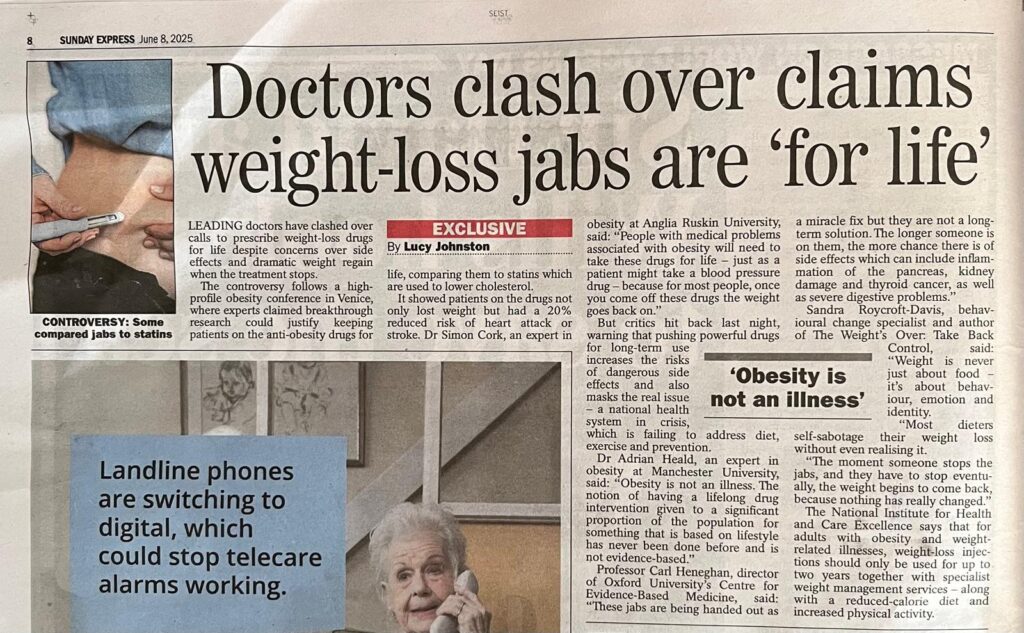“Well… they would just stay on them forever.”
That was the answer I got from an Obesity professor at a packed event called Ozempic Nation, after I asked this question:
“We all know that for 95% of people, the weight doesn’t stay off when they’ve been on a diet – so how is weight loss medication different because studies are saying for the majority of people, if they don’t change the way they eat and their lifestyle, they will only keep the weight off for a year”.
That moment stuck with me.
In the weeks that followed, I was asked to contribute to a national debate about the growing push to prescribe weight-loss drugs long term. Here’s what I said:
“Weight is never just about food — it’s about behaviour, emotion, and identity. Most dieters self-sabotage their weight loss without even realising it. The moment someone stops the jabs — and they have to stop eventually — the weight begins to come back, because nothing has really changed. You’ve done the equivalent of putting on noise-cancelling headphones in a crowded room: the sound is still there when you take them off. The long-term effectiveness of these drugs is uncertain. People’s health has to be the first priority.”

Let me be clear: this isn’t about being anti medication.
For some, weight-loss injections offer a much-needed medical intervention — a bridge to get to a place of better health. And I fully support informed, compassionate choices made with trusted healthcare professionals. But what I am deeply passionate about is ensuring we don’t lose sight of the root cause of weight struggles.
Because weight is not just about food.
It never has been.
It’s about years of habit, emotion, self-perception, identity. For many, it’s about safety, comfort, and even trauma. And unless those deep-rooted drivers are addressed, the weight — or something else — will eventually return.
This is why I created Slimpod. Not to replace medication. Not to judge or dictate. But to empower.
To build a mindset that makes long-term, sustainable change feel natural. Not forced. To gently rewire those deeply ingrained behaviours, so that healthy choices become automatic, not exhausting.
Yes, there are studies showing weight-loss drugs reduce the risk of heart disease and stroke. And that’s wonderful news for those who need them. But should we really be talking about prescribing these drugs for life? Especially when we’re not yet addressing the national crisis of emotional eating, broken relationships with food, and diet trauma?
Medication can silence the symptoms — but it doesn’t heal the cause.
You deserve more than a life of prescriptions. You deserve to trust yourself around food again. You deserve to feel normal. And that takes more than a jab.
So tell me…what do you think?
Do weight-loss jabs have a place in our future? Should they be a forever solution, or just one piece of a much bigger picture?
Let’s start a respectful, open conversation in the comments — because your voice matters.





5 thoughts on “Should We Be On Weight-Loss Jabs For Life?”
We don’t know enough about the long-term effects of these drugs.
It’s worth remembering that widespread adoption of their use is hugely profitable for the global pharmaceutical industry. Of course there is a lot of marketing and PR pressure to promote them. But is it actually beneficial to our health to be using these drugs for years? As yet, we don’t know – so we should be cautious, Remember Thalidomide, the drug hailed as a ‘miracle’ cure for morning sickness in pregnancy that turned out to cause multiple birth defects.
I absolutely agree Sandra
The injections may help to loose weight but if the mindset is not changed and the reasons behind weight gain are not addressed, the weight will creep back on as soon as the injections are stopped..
I personally have no problem with people using the injections as long as they have been obtained from a legitimate medical source.
There is evidence of side effects.
But there needs to be background work alongside to help change the reasons behind weight gain in the first place. A support network to turn to as Slimpod provides.
Unfortunately it’s not just a quick fix.
The individual may feel they are able to use the injections and Slimpod to help start them off initially.
The work as Sandra has taught us all, is all in the subconscious.
This subject is fascinating about how the human mind works.
I feel optimistic that a time will come when most people realise that drugs are a poor substitute for making the personal changes that obesity requires. the physiological effects of the underlying causes of ill health, are usually emotional trauma to some degree, and / or beliefs that have caused the person to act in a way that is against the best heath interests of their body. We have to tackle these personally if we are to have a healthy relaxed relationship with food and our bodies. I say all this as a psychologist, nurse, primary health care professional and leadership development coach who has been on an amazing journey, and only recently realised I have profound food issues through Slimpod. It’s gentle, subtle, person centred and science based approach is the one we have all be needing for so long.
I have been on Mounjoro for about a year and I have lost over 5.5 stone. In that time my portion sizes reduced and I also cut down on carbs and increased my proteins. I had been eating healthily at mealtimes for years (snacking had been my issue) so this was not a problem.
Now life without jabs is very simple. I continue with smaller portions but the extra I add is in number of meals a day. Whereas I couldn’t manage 3 meals while on the jabs I now can but these do not include carbs (or very little). I haven’t gone back to toast or porridge and if I have any at lunchtime I deduct in from my dinner.
I have found a way of merging the way I ate (healthily but small) when on the jabs with my newly increased appetite so the extra food doesn’t come with extra weight. It’s very sustainable (so far) even when menopausal.
I will forever be grateful to my endocrinologist for putting me on this medication and for the new life it’s given me. But I don’t want to be on jabs forever and don’t intend to ever need them again.
Hi there Caroline! Are you a Slimpod member?